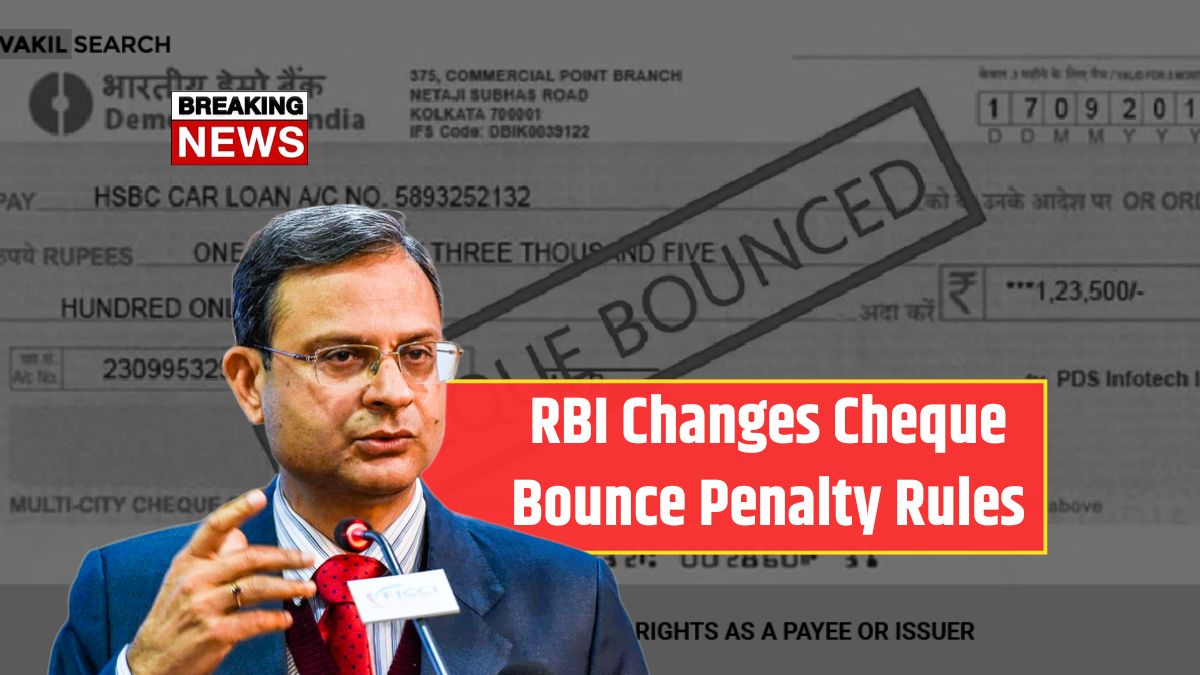Cheque Bounce Case – The Reserve Bank of India (RBI) has made some major changes to the rules around cheque bounce cases. These updates are a big relief for both banks and account holders. With digital payments becoming the norm, cheques are not used as often these days, but when they bounce, they still cause a lot of legal mess. The new RBI rules aim to simplify things, make the process faster, and hold repeat offenders more accountable.
What Exactly Is a Cheque Bounce?
A cheque bounce happens when a cheque you issue doesn’t clear. This usually happens because you don’t have enough money in your account, but it can also be due to things like signature mismatch, account closure, or if someone stops the payment after issuing the cheque. In India, this is treated as a criminal offense under Section 138 of the Negotiable Instruments Act.
So even though it might seem like a small issue, a bounced cheque can land you in legal trouble.
Also Read:
 3-Day Bank Holiday: Banks to Shut Down for 3 Days! Complete Your Work Before It’s Too Late
3-Day Bank Holiday: Banks to Shut Down for 3 Days! Complete Your Work Before It’s Too Late
Why RBI Decided to Update the Rules
Cheque bounce cases are clogging up the courts. Even though we’re moving towards digital transactions, a large number of disputes still involve cheques. RBI’s new rules are designed to make the system smoother, cut down delays, and ensure that both banks and customers follow responsible practices.
Here’s What’s New in RBI’s Guidelines
- Quick Notification: If a cheque bounces, banks now have to inform you within 24 hours via SMS and email. No more waiting for days to find out what went wrong.
- Account Freeze After Repeated Offenses: If your cheques bounce three times in a row, the bank can temporarily freeze your account. This is to prevent people from misusing cheque facilities.
- Standard Penalties: Earlier, every bank had its own charges for cheque bounce cases. Now, RBI has created a fixed penalty range, so all banks follow the same rules.
- Red Flag for Frequent Offenders: If someone keeps bouncing cheques, their details will be marked in RBI’s internal system. Other banks will be alerted if the same person tries to open a new account.
- No More Lifetime Cheque Book Bans: Earlier, if someone bounced cheques regularly, banks could ban them from using cheque books permanently. RBI has now discouraged this extreme step.
What It Means for You and Your Business
For individual customers, this is a good step. You’ll be informed instantly, and you won’t face surprise penalties. You’ll also get a chance to fix things before your account is frozen.
For businesses, especially small ones that deal with a lot of cheques, this is a wake-up call. It’s time to get your financial processes in order. Businesses should regularly track cheque activity, shift to digital payments when possible, and make sure their accounting teams understand the new RBI rules.
Also, using tools that scan and validate cheques before accepting them can be helpful. And keeping proper records will save a lot of legal headaches later.
Still a Legal Offense – But with a Softer Touch
Just to be clear, bouncing a cheque is still a criminal offense. Legal action can still be taken. But RBI wants to avoid dragging everyone to court. The new system encourages early resolution, digital alerts, and warnings before things get serious.
New Penalty Structure
Here’s a quick look at how the penalties will work now:
- First Bounce: A small penalty (around ₹150 to ₹300) and you get a warning via SMS or email
- Second Bounce: Higher penalty and a red alert gets raised in the bank’s system
- Third Bounce: Your account might get frozen for further cheque use
- Fourth Time and Beyond: Higher penalties, RBI Red Flag status, and possible legal action
RBI’s move is meant to promote responsible banking habits. If you’re someone who uses cheques regularly, make sure you have enough balance before issuing one. For businesses, this is the right time to switch to smarter and more secure payment methods.
With standard penalties, digital alerts, and better transparency, these rules will hopefully reduce legal battles and encourage smoother financial transactions for everyone.
Remember, this article is meant to give you a general understanding. For detailed legal advice or specific queries, you should refer to the official RBI guidelines or talk to a legal expert.



